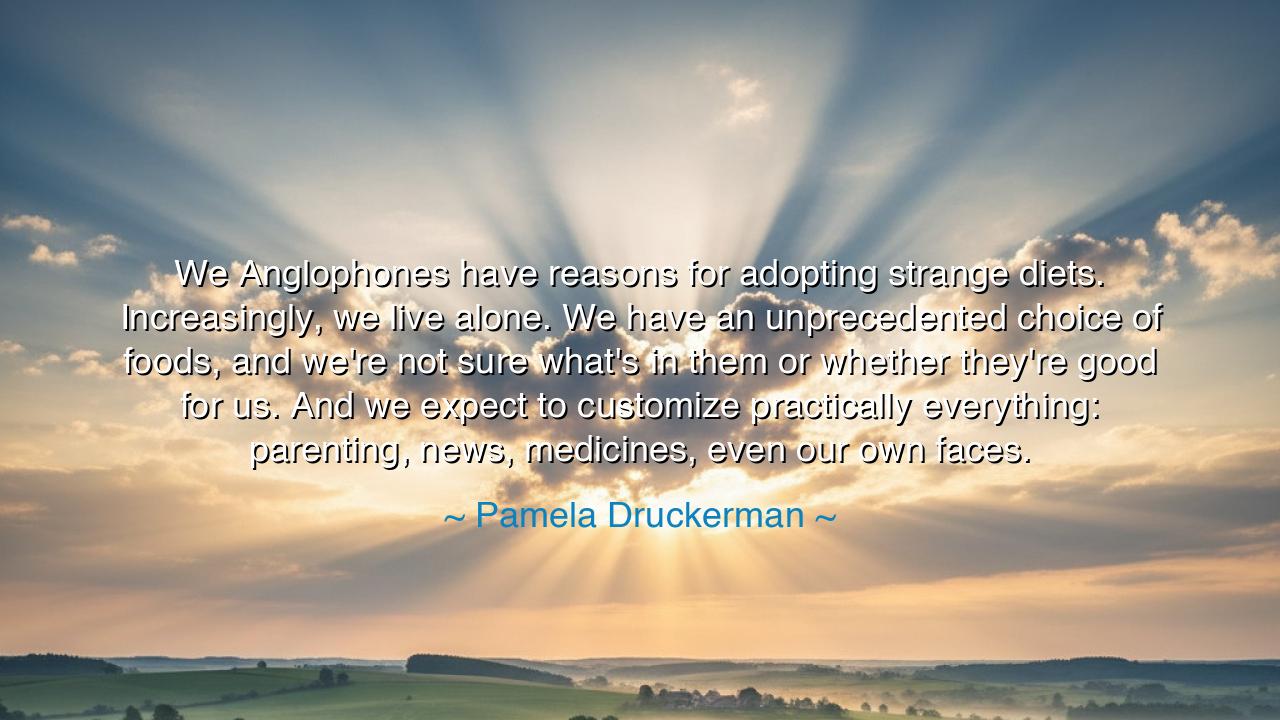
We Anglophones have reasons for adopting strange diets.
We Anglophones have reasons for adopting strange diets. Increasingly, we live alone. We have an unprecedented choice of foods, and we're not sure what's in them or whether they're good for us. And we expect to customize practically everything: parenting, news, medicines, even our own faces.






Hear the voice of Pamela Druckerman, who speaks to the plight of the modern soul: “We Anglophones have reasons for adopting strange diets. Increasingly, we live alone. We have an unprecedented choice of foods, and we're not sure what's in them or whether they're good for us. And we expect to customize practically everything: parenting, news, medicines, even our own faces.” These words, though rooted in the present, are heavy with echoes of the past. They reveal not merely a curiosity about food, but a mirror of our age, reflecting solitude, abundance, confusion, and the endless desire to mold the world to our will.
In ancient days, the meal was not merely sustenance but communion. The breaking of bread was an act of kinship, a binding of souls around the same fire. Yet now, as Druckerman laments, we are alone. The hearth has grown cold in many homes, and men and women take their meals not as gatherings of joy, but as solitary acts, performed in silence before the glow of artificial light. And so the table, once sacred, has become fragmented. This solitude breeds uncertainty, and into that uncertainty creep the strange diets, rituals of the isolated heart seeking meaning in the maze of modern plenty.
We live in an age of abundance, but abundance is its own burden. Where once our ancestors took what the season and the land provided, we now confront aisles overflowing with choices. Yet this plenitude conceals mystery, for though the shelves groan beneath their weight, we do not know what lies hidden in the offerings. Strange names, chemicals, and labels whisper secrets we cannot fully decipher. Thus, abundance gives rise not to peace, but to suspicion. And in our suspicion, we cling to fads and fashions of food, believing salvation may be found in the ritual avoidance of wheat, or sugar, or meat.
Druckerman warns us also of the restless spirit of customization—that modern creed which demands that nothing remain fixed or universal. We no longer inherit traditions as they are, but shape them endlessly to our own desires. We want to customize our children’s upbringing, our news, our medicine, even the very lines of our faces. Yet in this relentless molding of reality, we risk losing the wisdom of what is shared, of what is given, of what endures. To customize endlessly is to uproot oneself from the soil of tradition, leaving the soul untethered, adrift in an ocean of self-invention.
Let us recall the tale of the Roman banquets in the final years of the Republic. Senators and generals, freed by conquest from scarcity, drowned themselves in exotic foods brought from every corner of the empire. They customized their feasts, demanding flamingo tongues, rare wines, and fruits plucked in distant lands. Yet this indulgence did not strengthen Rome—it weakened it. While the body fed on strange delicacies, the spirit starved of discipline. So too with us: our endless choice and customization may nourish the ego, but it can leave the soul lean and hungry.
The lesson is clear: abundance without wisdom breeds disorder, and customization without restraint breeds emptiness. The ancients remind us that discipline, simplicity, and community are the true pillars of health. To eat together, to share in what is near and seasonal, to find contentment in sufficiency—these are practices that guard the heart against both confusion and excess. The strange diets of our time, born of fear and loneliness, will not heal us unless they are guided by deeper truths.
Therefore, let each listener take this teaching to heart: Do not eat only to fill the body, but to nourish the spirit. Seek not only novelty, but balance. Share your meals when you can, for communion is greater medicine than any supplement. And when faced with a thousand choices, remember that simplicity has ever been the friend of wisdom.
Thus do the words of Druckerman, though cast in modern light, carry the timeless wisdom of the ancients. For though our shelves are filled, and our mirrors show endlessly customizable faces, the soul’s hunger remains unchanged: the hunger for connection, for meaning, for truth. And if we are wise, we will feast not only with the mouth, but with the heart.






AAdministratorAdministrator
Welcome, honored guests. Please leave a comment, we will respond soon